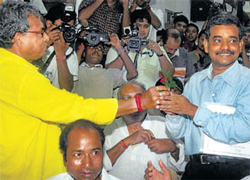
Jangipur (West Bengal), October 8: The welfare projects undertaken by his father President Pranab Mukherjee during his tenure as Lok Sabha MP have stood son Abhijit, contesting the Oct 10 Jangipur Lok Sabha by-poll in West Bengal's border district of Murshidabad, in good stead.
Abhijit, a first-time Congress legislator from Nalhati assembly constituency of Birbhum district of the state, is being fielded by the Congress from Jangipur. The Lok Sabha seat fell vacant after his father Pranab Mukherjee was elected president.
Though Abhijit battles the heat and dust and campaigns on the muddy roads of Jangipur, it is the record of development works undertaken during his father's tenure as MP that are spoken of most.
Pranab Mukherjee - two-time Lok Sabha MP from Jangipur since 2004 - used his clout as the 'number two' of the Indian government to bring in prosperity and welfare projects in the area.
Pranab Mukherjee - who since his 2004 victory made Jangipur his second home - had always been 'indebted' to the people of Jangipur for electing him as Lok Sabha MP, which in turn had helped him to remove the tag of "rootless wanderer," a tag that stuck long since he had been unable to enter the Lok Sabha despite being in politics since the late 1960s.
Now, with Abhijit in the poll fray, ready to step into his father's shoes, the son seems to tread an easier path, since both Jangipur and Murshidabad district as a whole have been considered a bastion of the Congress since the mid-nineties.
"Pranab babu has done a lot of development for the area. Now, we wish that if Abhijit babu wins, he will carry forward his father's developmental projects," said Samsul Alam, a resident of Jangipur.
Congress supporters claim Abhijit has the upper hand over his nearest rival of the Left Front, given the work his father has done for the area in the last eight years and considering the victory margin of two lakh that Pranab registered in the 2009 Lok Sabha polls.
With a total electorate of 10,86,052, the constituency is considered to be a Muslim majority constituency.
Clad in kurta and pyjama, Abhijit greets people lining the roads and peeping from their windows and rooftops in villages and small towns with a smile and folded hands.
Two of the most important concerns that the people of Jangipur face are land erosion - vast acres of land have been swept by the Brahmaputra - and arsenic contamination in ground water.
Congress supporters claim that under Pranab Mukherjee's initiative, work has started on a plant to purify water of arsenic. Several steps have been taken to prevent erosion.
Although a total of 11 candidates are in the poll fray, Abhijit's main rival seems to be Left Front's Muzzafar Hossain. The Trinamool Congress has decided not to contest the by-election.
CPI-M politburo member Biman Bose Sunday accused the Congress of inciting violence and creating an atmosphere of terror in Jangipur.
"Two CPI-M supporters have been killed in the area. The Congress is perplexed with the questions that are being asked over the fake promises that they have made in last eight years. So, to terrorise the people, two people have been killed," said Bose in a statement.
Bose appealed to voters of the area to be calm and defeat the alleged terror tactics initiated by the Congress.





Comments
Add new comment